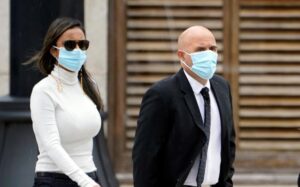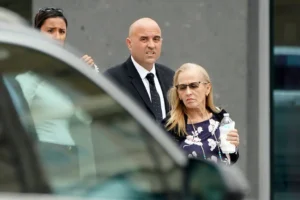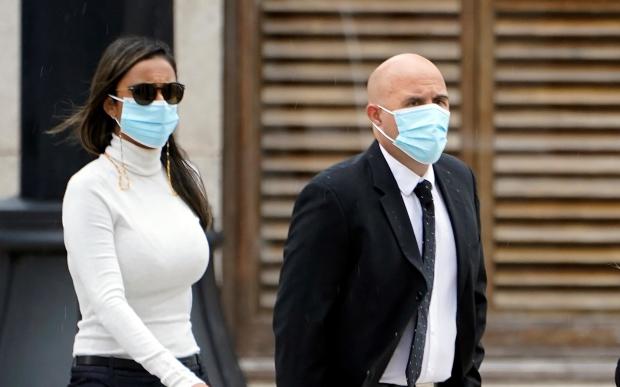
A former DEA special agent was sentenced this week to 145 months, or more than 12 years, in prison for operating a money laundering and fraud scheme while serving as a special agent with the DEA.
According to court documents, Jose I. Irizarry, 46, of Dorado, Puerto Rico, pleaded guilty on Sept. 14, 2020, to all counts in a 19-count indictment.
This included conspiracy to commit money laundering, honest services wire fraud, bank fraud, and aggravated identity theft.
At the conclusion of Thursday’s sentencing in Tampa, Florida, U.S. District Judge Charlene E. Honeywell ordered Irizarry to begin serving his term of imprisonment immediately.
Irizarry was remanded into the custody of the U.S. Marshals Service for transfer to the Federal Bureau of Prisons.
Irizarry was also ordered to pay $11,233 in restitution and forfeit his interests in a diamond ring and a luxury sports car.
 “Irizarry betrayed his oath to serve and instead used his position to further the criminal activities of a violent drug cartel while enriching himself,” said Special Agent in Charge Brian Payne of IRS-Criminal Investigation (IRS-CI). “While his actions represent an egregious breach of the public trust, they are in no way a reflection of the overwhelming majority of special agents who serve with honor and integrity. IRS-CI will take every step necessary to ferret out those who cave into temptation and grossly misuse their power.”
“Irizarry betrayed his oath to serve and instead used his position to further the criminal activities of a violent drug cartel while enriching himself,” said Special Agent in Charge Brian Payne of IRS-Criminal Investigation (IRS-CI). “While his actions represent an egregious breach of the public trust, they are in no way a reflection of the overwhelming majority of special agents who serve with honor and integrity. IRS-CI will take every step necessary to ferret out those who cave into temptation and grossly misuse their power.”
According to the indictment and his plea agreement, the scheme began shortly after Irizarry filed for personal bankruptcy protection in 2010.

Irizarry used his position as a special agent to divert approximately $9 million from undercover DEA money laundering investigations to himself and to co-conspirators.
In return, Irizarry received bribes and kickbacks worth at least $1 million for himself and his family, which was used to purchase jewelry, luxury cars, and a home.
To carry out the scheme, Irizarry and his co-conspirators used a stolen identity to open a bank account under false pretenses and then utilized the account to receive diverted drug proceeds.
The scheme lasted throughout Irizarry’s assignments to the DEA’s Miami Field Division and to its office in Cartagena, Colombia.
“The Department of Justice has zero-tolerance for abuse of public office and is committed to ferreting out and prosecuting corruption wherever found, especially among the ranks of law enforcement,” said Assistant Attorney General Kenneth A. Polite Jr. of the Justice Department’s Criminal Division.
“Public corruption is the FBI’s top criminal investigative priority, and we will not be deterred in our commitment to expose the deceitful even if it means arresting a former federal agent,” said Special Agent in Charge Michael McPherson of the FBI’s Tampa Field Office. “The FBI and its federal, state, and local law enforcement partners will remain steadfast and focused on the work to maintain the public’s trust in government.”
“This is an egregious breach of the trust by a federal agent who was sworn to protect and serve the American people,” said Special Agent in Charge John Condon of Homeland Security Investigations (HSI) Tampa Field Office. “While his actions are uncharacteristic of the dedication and integrity demonstrated by the vast majority of government employees, this case should send a message about the serious consequences facing those who would exploit their positions and violate that special trust.”
“We trust law enforcement officials to uphold the oath and bring criminals to justice,” said Special Agent in Charge James F. Boyersmith of the Department of Justice Office of the Inspector General (OIG) Miami Field Office. “Instead, Irizarry actively participated in drug trafficking and money laundering schemes. But today, justice was served. He will rightly serve time for his crimes.”
The FBI, DEA, HSI, IRS-CI and the Department of Justice OIG investigated the case.
RELATED STORY:
News Story: March 27, 2015
The prostitution scandal in the Drug Enforcement Agency is prompting calls to “clean house.” The parties allegedly took place between 2005 and 2008, but investigators only found out years later.

